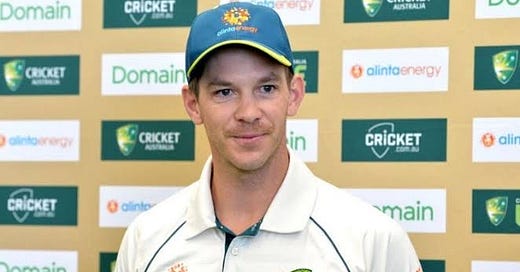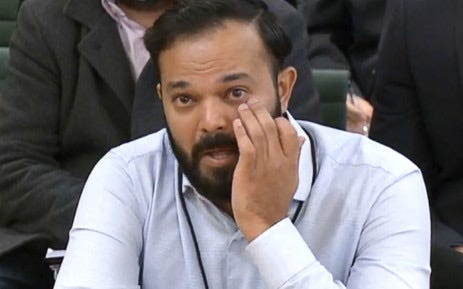It has been an astonishing news week, starting with the harrowing testimony to a committee of parliamentarians by former Yorkshire player Azeem Rafiq about the racist bullying he was subjected to at a club which its recently resigned chairman admitted was ‘institutionally racist.’
South African cricket has more than enough problems of its own to pay attention to prejudice elsewhere there was more than enough in the recent SJN Hearings to keep South Africans busy with domestic house-keeping, but nothing quite compared to the harrowing misery Rafiq described. But it would be naive to believe South African cricketers of colour have not suffered similar.
Then came Australian Test captain Tim Paine’s resignation from the role. The story was so staggering, on so many levels, it will take weeks if not months to digest. It is easy to judge – but not so easy to know who to judge. The man sent an unsolicited photograph of his meat-and-two-veg to a female colleague at Cricket Tasmania, with lewd and crass messages.
Cricket Australia and Cricket Tasmania knew all about it because they both deemed him not guilty of breaching their respective Codes of Conduct. Yet Cricket Australia still believed that Squeaky Clean Tim was the right man to head up the ‘new’ Australia after the squalid Sandpaper cheating episode at Newlands. No wonder most of the rest of the world were doubtful, cynical even, that a fresh page had been turned.
It seems inconceivable that any man sexually harassing a female colleague in the work-place could be exonerated of wrong-doing. It also appears inexplicable that his employers would subsequently consider him to be the right man to assume the role often described in Australia as the ‘second most important job in the country’ behind the Prime Minister. Unless they were super-confident that the episode had been buried.
So the ‘crime’, it appears, wasn’t sending a snap of your knackers to an unsuspecting and unappreciative colleague. It was being exposed as having done so. Cricket Australia spent millions of dollars on ‘ethics committees’ tasked with reinventing a brighter, cleaner, more honest future. A better reputation. It would appear their motives were made of plastic, their intentions insincere and their objectives irrelevant. If that was not the case, why did Paine resign? We shall see.
But it’s a matter of significantly less off-field gravitas and far more on-field importance that has been occupying my mind this week. South Africa’s forthcoming World Cup Super League series against the Netherlands. For at least 20 years I’ve been advocating the importance of ‘context’ in the majority of bilateral contests. The Ashes doesn’t need ‘context’, obviously, but New Zealand and India starting a three-match T20I series three days after the T20 World Cup final? Pakistan and Bangladesh doing the same…?
The significance of the Netherlands’ visit to South Africa was highlighted here many months ago when the Proteas’ stumbled in the early stages of their campaign to qualify automatically for the 2023 World Cup. The decision to ‘rest’ Quinton de Kock and David Miller for the ODI series against Sri Lanka in September may have contributed to the 2-1 series loss. Probably did.
South Africa currently sit ninth on the 13-team log. Only the top eight automatically qualify for the World Cup. The number of games played vary wildly between the 13 teams and fixtures are random. Ireland and the Netherlands are currently ahead of South Africa but have series ahead they would be expected to lose.
South Africa, on the other hand, have a home series against Bangladesh following their Netherlands series and two away series against India and Australia. It is perfectly imaginable that they may stumble, completely, against India and Australia on home soil. As I have said several times, the Proteas could find themselves competing for a place in the next World Cup against Hong Kong, Singapore, Papua New Guinea and Canada – in Zimbabwe – unless they win at least eight of their remaining 12 games.
So it took some courage to leave out nine of the 15 players who featured in the T20 World Cup squad from the squad to play the Netherlands starting on November 26. Quinton de Kock, Aiden Markram, Kagiso Rabada. Anrich Nortje, Rassie van der Dussen…that’s pretty much the cream of the crop. All rested. Mind you, there are some seriously impressive replacements. So everything should be fine. There are 10 points available per match, and South Africa need all 30.
The Netherlands boast five South African born-and-bred players amongst their 17-man squad. They will be ‘mentored’ by another, Ryan ten Doeschate. Stephan Myburgh, 37, and Roelof van der Merwe, 36, both hit a hard ball. They are past their prime but still dangerous. Brandon Glover, 24, an SA under-19 representative, is a genuinely fast bowler capable of wreaking havoc in any top order. Colin Ackermann, 30, and Clayton Floyd, 25, offer solid top order batting and left arm spin.
Nobody is suggesting that the Netherlands are anything more than extreme underdogs but, given the importance of the outcome, and the points towards qualification, it’s fair to say that South Africa’s selection of an effective ‘A’ team to face the minnows from Holland is bold. Dutch Courage





I had not realised that Cricket Australia appointed him as captain in the 'new era' AFTER they knew about this behaviour with a member of staff. That is ridiculous. Surely the head of cricket there should also resign? The Barmy Army songbook just writes itself.....